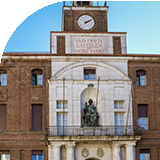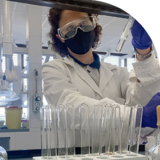Useful Tools
Visita anche

Unicatt
Università Cattolica: the university, programmes, admission and faculty

Academic Staff
Profile, teaching, announcements

Research
Scientific research, projects, structures

International students
Study at Università Cattolica
Following student requests, the DDS’ administrative office will work to ensure that all buildings, classrooms and exam areas are accessible and, if necessary, will enable students to use lifts otherwise reserved for authorised personnel only.
Seats are reserved in the University libraries and in the hallways of some departments for students with disabilities.
The DDS’ offices are available to students to help them find learning materials in accessible formats.
In the Milan and Brescia campuses, an accompanying service is available for students with motor or sensory disabilities. Specifically, the following services are guaranteed:
Classroom accompaniment: this does not include in-class learning support;
Accompaniment to Student Services, administrative offices, libraries and departments;
Accompaniment to the campus cafeterias: the student is guaranteed help with the carrying of trays and the preparation of meals, but not feeding assistance;
Accompaniment to the toilets (special keys are also provided). Accompaniment to the University's accessible toilets is guaranteed, but personal hygiene assistance is not provided inside the toilets.
At the Milan campus only, an escort service with a minivan is provided to and from the main railway and metro stations in the Milan urban network.
The Disability and Dyslexia Services offer students with disabilities or DSA, who present regular documentation (see Beneficiaries), the opportunity to be supported by a pedagogy consultant to achieve a satisfactory and independent academic career. In particular, there are three areas of intervention that our pedagogy consultants cover:
Method of study
Attendance of lectures
Taking exams
1. Method of study: through individual and group interviews (see Notices and events), the pedagogy consultant accompanies the student in identifying cognitive and organisational strategies that are effective in facing academic commitments with maximum autonomy.
2. Attendance of lectures: In the event of specific needs, the pedagogy consultant contacts the instructors to adapt the teaching methods and materials so that they are accessible to the student's needs.
3. Taking exams: the pedagogy consultant agrees with the student, bearing in mind the guidelines for universities on compensatory measures (see Laws and Network), on the tools needed to take examinations in equivalent mode and communicates them to the instructors.
Specifically, compensatory measures (e.g.: "additional time, aids and technical tools, presence of communication assistants ..." from the "Conferenza Nazionale Delegati per la Disabilità (CNUDD), Linee guida, Bergamo, 10 July 2014") will be assessed by the Services in a personalised manner. The possible use of particular external support tools for oral exams - such as concept maps/charts/word lists... - will be communicated by the Services to the instructors in the first year of attendance. During this period the student will be accompanied on a training path aimed at achieving greater autonomy which will enable him/her to sit exams without the use of external tools, such as concept maps/charts/word lists, thanks to the use of strategies that meet the demands of university knowledge and professional skills. If the student, after the first year, decides to request the use of external tools, it will be up to the instructor to assess their appropriateness "in relation to the specificities of the individual disciplines and the purpose of the study courses" (from "Conferenza Nazionale Delegati per la Disabilità (CNUDD), Linee guida, Bergamo, 10 July 2014).
Requests for special examination date and changes to the way examinations are held are in no way acceptable, except in very exceptional cases which will be duly verified and subsequently proposed to instructors by the Services.
With regard to requests for compensatory measures, students are required to agree on the necessary tools with the pedagogy consultant or to request them using the appropriate forms and to respect the deadlines set for effective communication.
Learning support is free of charge, but it is necessary to book the interviews by telephone or in person with the relevant DDS’ administrative office.
The Disability and Dyslexia Services office provide tools - computers and other hardware or software solutions - useful for teaching that can compensate for students' difficulties. To access an assessment of specific needs and identify the best personalised solutions, it is necessary to book an interview by telephone or in person with with the relevant DDS’ administrative office. Access to the technology consultation is free of charge.
Università Cattolica del Sacro Cuore uses cookies on this site. Cookies are used to allow the enjoyment of our services and to optimize the user experience. Only technical cookies are active. For more information, refer to the Information on the processing of navigation data and cookies
Ok